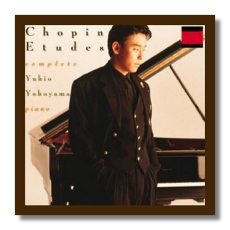
The Internet's Premier Classical Music Source
Related Links
- Chopin Reviews
- Latest Reviews
- More Reviews
-
By Composer
-
Collections
DVD & Blu-ray
Books
Concert Reviews
Articles/Interviews
Software
Audio
Search Amazon
Recommended Links
Site News
 CD Review
CD Review
Frédéric Chopin

Études
- 12 Études, Op. 10
- 12 Études, Op. 25
- 3 New Études, Op. Posth
Yukio Yokoyama, piano
Sony SK62605 DDD 65:23
Yokoyama possesses a tonal palette of immense range, an all encompassing technique, and an innate sense to balance juxtaposing ideas within a framework that embraces, in judicious measure, passion and logic, sensuality and boldness. All the riches of Chopin are here, romanticized more than classicized, in performances that bespeak talent rarely found in someone of this pianist's youth: he was twenty-one when he made this recording in 1992, and why Sony kept it under wraps for four years, I'll never know. Better late than never, I guess. Simply stated, this is phenomenal playing. Perhaps from this single recording it would be premature to rank Yokoyama with the Chopin giants of the past and present – Rubinstein, Cliburn, Argerich, Zimerman and Ashkenazy. But the thought comes to mind still as one listens to him, mesmerized by pianism that mere words can't describe.
Hear the dynamic thrust and brilliance of the opening étude of Op. 10 (in C Major – track 1). You sense instantly that you're hearing a distinctive voice, a pianist with the fingers to keep pace with his transcendental ideas. And try #4 in C minor (track 4) to hear dazzling passage work that infuses the piece with such a fleet and charming effervescence you're apt to become breathless in your passive role as listener. #5 (the famous Black Key Étude) is rendered with a delicious propulsiveness, yet balanced in the right places with a graceful delicacy. Yokoyama deftly conveys the melancholic obsession in #6 (E Flat minor), and the telling drama and agitation in the Revolutionary Étude (#12).
In the Op. 25 set he continues with the same insight and virtuosity, but now deepens his expressive language, cognizant Chopin had further developed his artistry in the three or so years that separate the two sets. Listen to Yokoyama's subtle coloration in #6 (in G minor – track 18) or to his tonal allure in the sweet sadness of the following C Sharp minor Étude. The one controversial reading here is of #3 in F (track 15), where the pianist adds weight to the base notes in this jaunty gallop along the keyboard, turning the piece into a kind of epic-sounding statement of joyous music-making. To me, this approach works; to some, however, the thicker textures may seem too caloric, at odds with the lean renderings their ears are accustomed to.
Comparisons? If I were consigned to a desert island for life, I would be perfectly satisfied with just this rendition of the two sets of études and the Three New Études. I might concede, however, that if someone could strip the sonic deficiencies from Ashkenazy's first recording of the études (circa 1960, now available on Saga in mono sound), I might find myself yearning for its ebullience and virtuosic flair. But even then, I believe I would favor this splendidly recorded Sony effort by a pianist I'm sure you'll be hearing more of. Highest recommendations.
Copyright © 1999 Robert Cummings


















